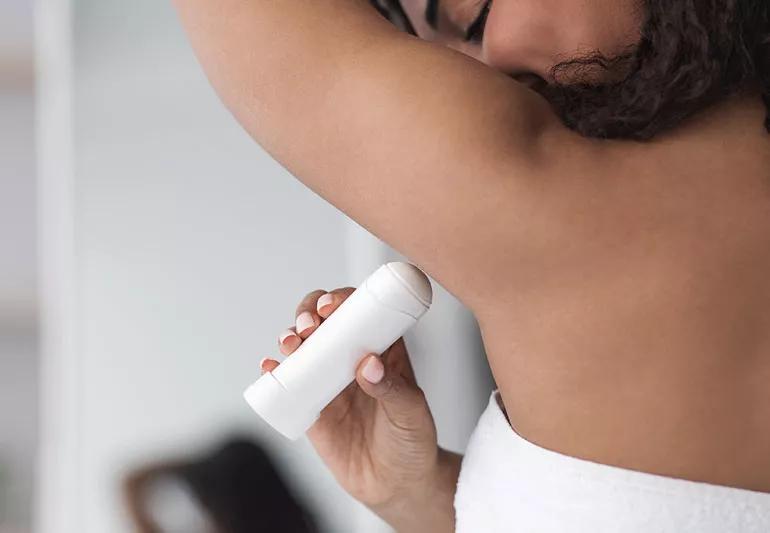Research doesn’t show a link between the personal hygiene product and breast cancer

Image content: This image is available to view online.
View image online (https://assets.clevelandclinic.org/transform/af9a6424-f531-4937-bb73-5f18f0b8ab65/deodorantBreastCancer-1328832779-770x533-1_jpg)
person applying deodorant
Scientifically speaking, theories linking deodorants to breast cancer don’t pass the smell test.
Advertisement
Cleveland Clinic is a non-profit academic medical center. Advertising on our site helps support our mission. We do not endorse non-Cleveland Clinic products or services. Policy
No strong scientific evidence has linked deodorant and antiperspirant use to the development of breast cancer, reports the National Cancer Institute. Research shows that any perceived risk is nothing to … well, sweat about.
But cancer-causing rumors continue to linger around personal hygiene products that keep armpits fresh and dry. So, let’s take a closer look at the issue with radiation oncologist Chirag Shah, MD, and medical oncologist Tiffany Onger, MD.
Has there been extensive study looking into the potential connection between breast cancer and deodorants? Not exactly. The American Cancer Society described the research as being “limited.”
But the results of various studies have NOT shown any clear relationship between the use of deodorants and antiperspirants and breast cancer. Dr. Shah and Dr. Onger both emphasize this point.
“Please feel comfortable using whatever deodorant you’d like to use,” says Dr. Onger.
Video content: This video is available to watch online.
View video online (https://www.youtube.com/embed/6ZWcawWkEl0?si=7zgMVQML4hUuGQsq)
YouTube video player
Odds are you haven’t taken the time to read the ingredient list on your deodorant or antiperspirant. But if you did, you’d likely find a few potential chemical toxins such as:
Advertisement
Given increased attention to chemicals and cancer risk, that’s a list that can draw concern. But as noted, no conclusive studies have linked chemicals in deodorants and antiperspirants to breast cancer.
Now there’s another ingredient in antiperspirants — aluminum — that draws the most attention when it comes to breast cancer risk. (Aluminum is typically not in plain deodorant.)
The aluminum compound in antiperspirant works to plug sweat ducts in your armpits so sweat doesn’t reach your skin’s surface. That prevents embarrassing sweat marks from darkening your shirt.
Some believe that this trace of aluminum can have estrogen-like effects if absorbed by your skin on a daily basis. (Studies say that estrogen can fuel the development and growth of breast cancer cells.)
“But nothing has shown that aluminum in your deodorant is producing estrogen-like effects or causing breast cancer,” states Dr. Shah.
Another factor in the deodorant-cancer theory is this: Anyone getting a mammogram is asked not to wear deodorant or antiperspirant. (Sounds suspicious, right?)
But the reason for the request has nothing to do with potential cancer risk. Instead, any aluminum in underarm products can appear as white spots on mammogram images and complicate the assessment.
“We just want to prevent any sort of confusion,” clarifies Dr. Onger.
As also noted, there are chemicals in most on-the-shelf deodorants and antiperspirants — and it’s understandable to want to limit your exposure to limit any potential cancer risk.
Underarm hygiene products made from more natural ingredients are available if that’s your desire. Some people even use plain baking soda as a deodorant given its proven odor-fighting ability.
But just because something is touted as “natural” doesn’t mean it won’t cause issues. Watch for any type of breakout, rash or skin irritation and talk with your healthcare provider if they become problematic, suggests Dr. Shah.
There’s also the option of not using any deodorant or antiperspirant if you’re worried about exposure to chemicals or other irritants. (For the record, deodorants are formulated to mask odors. Antiperspirants are designed to stop sweating.)
Rumors tying deodorants to breast cancer risk date back decades. Some believe it started with an email hoax in the 1990s.
So, is your choice of deodorant or antiperspirant really something to worry about? Probably not.
“Age, the use of hormone replacement therapy and family history are some of the biggest risk factors for breast cancer,” states Dr. Shah. “Those are things we should probably be more focused on when it comes to breast cancer risk.”
Advertisement

Delivered every Tuesday!
Sign up for our Health Essentials emails for expert guidance on nutrition, fitness, sleep, skin care and more
Learn more about our editorial process.
Advertisement
It’s important to share the news in an honest and age-appropriate way
Carcinomas are the most common and affect skin and organs
7 healthy eating tips to help reduce your risk of some of the most common types of cancer
Research on the controversial issue is mixed, but there are safety precautions you can take
It’s not just smoking and genetics that can increase your risk of cancer
Misconceptions can be worse than reality
How to stay informed and in charge
School can be a powerful ally during your treatment
Type 2 diabetes isn’t inevitable with these dietary changes
Applying a hot or cold compress can help with pain
Pump up your iron intake with foods like tuna, tofu and turkey